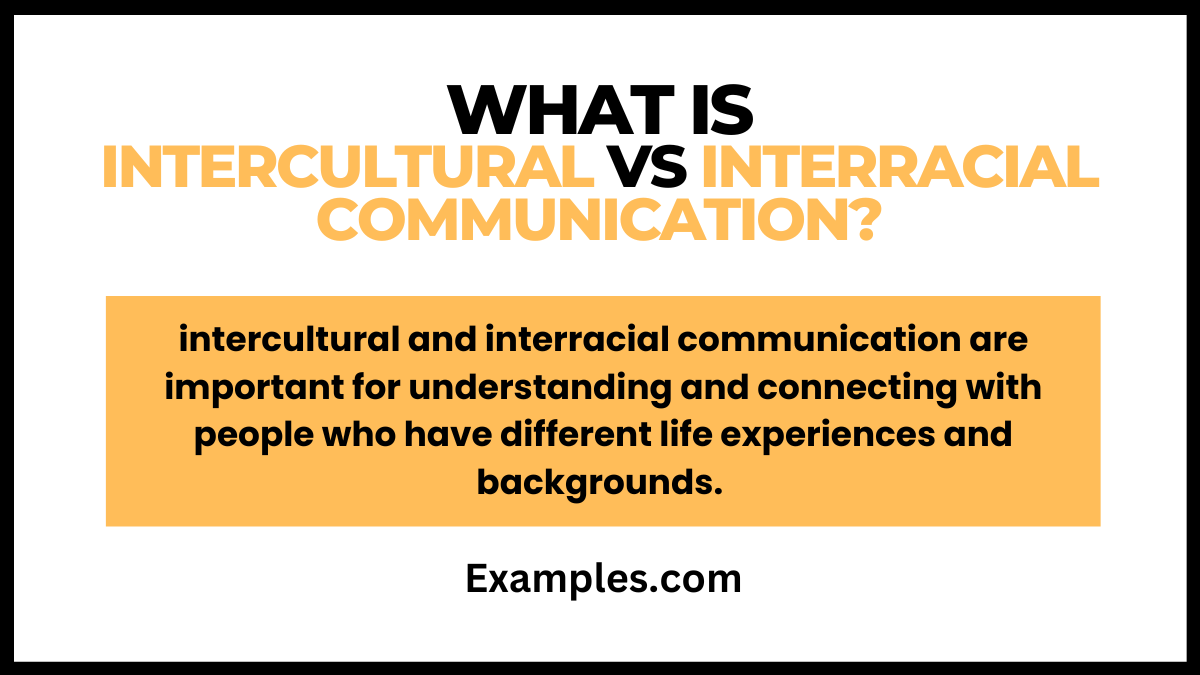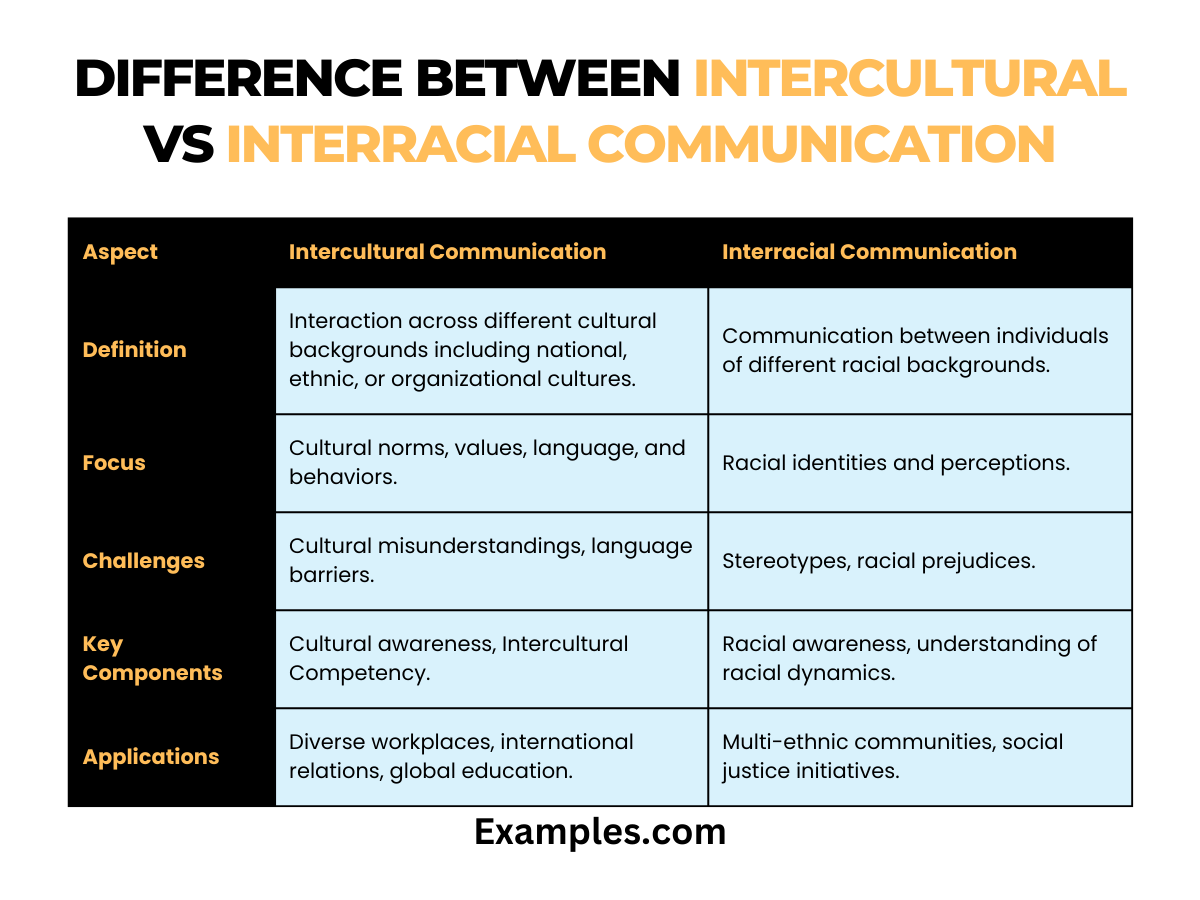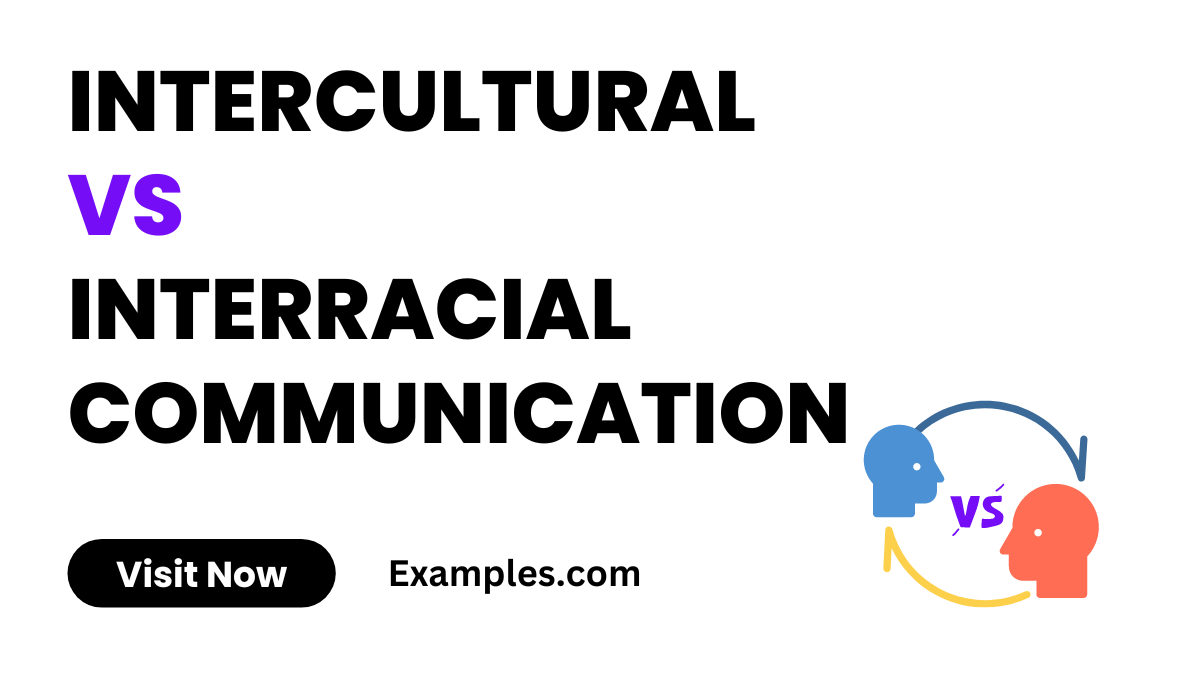Intercultural vs Interracial Communication – 19+ Examples
Embark on a journey through the fascinating world of Intercultural vs Interracial Communication. This comprehensive guide, enriched with practical Intercultural Communication Examples, delves into the key distinctions and overlaps between communicating across different cultures and racial backgrounds. Whether you’re a professional, student, or curious learner, this guide offers valuable insights and sentence examples to enhance your understanding and skills in navigating diverse communication landscapes. Discover the nuances and embrace the richness of our diverse world through effective communication.
What is Intercultural vs Interracial Communication?

Intercultural communication is about how people from different cultural backgrounds share information and understand each other. It involves learning about and respecting different cultural traditions, beliefs, and ways of communicating. This type of communication is important in a world where people from many cultures meet and work together.
Interracial communication, on the other hand, focuses on interactions between individuals of different racial backgrounds. It’s about understanding and respecting the unique experiences and perspectives that come with each racial identity. This communication is key in building respectful and inclusive relationships in diverse societies.
Both intercultural and interracial communication are important for understanding and connecting with people who have different life experiences and backgrounds. They help us to communicate better and build stronger, more diverse communities and workplaces.
Difference Between Intercultural vs Interracial Communication
When discussing communication and the dynamics of human interaction, it’s essential to distinguish between Intercultural Communication and Interracial Communication. Although these terms are often used interchangeably, they refer to different concepts. A table is an effective way to highlight these differences:

| Aspect | Intercultural Communication | Interracial Communication |
|---|---|---|
| Definition | Involves the interaction between people from different cultural backgrounds, encompassing national, ethnic, and even organizational cultures. | Focuses on communication between individuals of different racial backgrounds, which may or may not involve cultural differences. |
| Scope | Broader, as it considers various elements such as language, customs, beliefs, and behaviors that are shaped by culture. | More specific, dealing primarily with racial identity and perceptions that arise from racial differences. |
| Primary Focus | Understanding and bridging cultural gaps, promoting effective communication across cultural boundaries. | Addressing and understanding racial dynamics and their impact on communication. |
| Common Challenges | Language barriers, cultural misunderstandings, differences in communication styles. | Prejudices, stereotypes, and societal attitudes towards different races. |
| Key Components | Elements of Intercultural Communication, Intercultural Communication Skills, and Intercultural Communication Competence. | Racial identity, racial dynamics in communication, and awareness of racial biases. |
| Application Examples | Intercultural Communication in the Workplace, Intercultural Communication in Education, Intercultural Communication in Healthcare. | Interracial dialogues in social settings, interracial dynamics in educational institutions, interracial interactions in multi-ethnic communities. |
| Theories and Models | Intercultural Communication Theories, Intercultural Development Theory, Cross-Cultural Communication. | Theories focusing on race relations, racial identity development models. |
| Strategies for Improvement | Intercultural Communication Strategies, How to Improve Intercultural Communication, Tips for Intercultural Communication. | Strategies for enhancing racial understanding, educational programs focusing on racial diversity and inclusivity. |
10 Examples of Intercultural Communication Skills
In the realm of Intercultural Communication, certain skills are essential for effective and harmonious interactions across diverse cultures. Here are ten key examples:
- Active Listening: Paying close attention to what is being said, understanding the context, and acknowledging the speaker’s perspective.
- Cultural Awareness: Having knowledge of different cultural practices, norms, and values.
- Empathy: Demonstrating understanding and sensitivity to the feelings and experiences of individuals from different cultures.
- Language Skills: Ability to communicate in multiple languages or using non-verbal cues effectively.
- Open-mindedness: Being receptive to new ideas and different ways of thinking.
- Adaptability: Adjusting communication style and behavior to suit different cultural contexts.
- Patience: Taking time to understand and respect cultural differences in communication styles.
- Observation Skills: Noticing and correctly interpreting non-verbal cues and body language.
- Respect for Diversity: Valuing and respecting cultural differences without judgment.
- Conflict Resolution: Navigating and resolving misunderstandings or conflicts in a culturally sensitive manner.
10 Examples of Interracial Communication Skills
Effective Interracial Communication requires a distinct set of skills to navigate the nuances of race-related conversations. Here are ten crucial skills:
- Understanding of Racial Dynamics: Recognizing the historical and social contexts that shape racial experiences.
- Active Listening and Empathy: Focusing on what is being shared and showing genuine understanding of another’s racial perspective.
- Self-awareness: Being conscious of one’s own racial identity and biases.
- Openness to Discuss Race: Willingness to engage in conversations about race, even if they are uncomfortable.
- Respectful Inquiry: Asking thoughtful questions to understand different racial experiences and viewpoints.
- Non-defensive Communication: Responding to racially sensitive topics without defensiveness or aggression.
- Avoiding Assumptions: Not making assumptions based on race or ethnic background.
- Educating Oneself: Continuously learning about different racial histories and current issues.
- Advocacy and Allyship: Standing up against racial discrimination and supporting equality.
- Patience and Persistence: Recognizing that understanding and change take time and ongoing effort.
Comparison Between Intercultural vs Interracial Communication
In the realm of effective communication, understanding the nuances between Intercultural Communication and Interracial Communication is crucial. Both forms of communication address diversity, but they focus on different aspects of human interaction.
Focus and Scope
- Intercultural Communication: This type of communication primarily deals with interactions among people from different cultural backgrounds, which may include differences in nationality, ethnicity, religion, and even organizational culture. It encompasses a wide range of elements such as language, customs, values, and non-verbal communication behaviors.
- Interracial Communication: In contrast, Interracial Communication refers to the exchange of information between individuals of different racial backgrounds. It tends to focus more narrowly on the racial aspects of communication, including perceptions, experiences, and dynamics shaped by racial identity.
Challenges and Barriers
- Challenges in Intercultural Communication: Key challenges here include language barriers, cultural misunderstandings, and varying communication styles. These challenges arise from the deep-rooted cultural norms and values that shape an individual’s way of communicating. Barriers & Challenges of Intercultural Communication often involve misinterpretations and miscommunications due to these cultural differences.
- Challenges in Interracial Communication: The main hurdles in this area are often centered around racial biases, stereotypes, and societal attitudes towards different races. These challenges are more about overcoming the preconceived notions and prejudices that individuals may have towards other races.
Importance and Strategies for Improvement
- Importance in Intercultural Communication: The importance of Intercultural Communication lies in its ability to bridge cultural gaps, promoting understanding and collaboration in diverse settings like global businesses, healthcare, and education. Strategies for improvement include developing Intercultural Communication Skills and Competency, and employing Intercultural Communication Strategies.
- Importance in Interracial Communication: This form of communication is crucial for fostering racial harmony and understanding in multicultural societies. Strategies for improvement focus on promoting racial awareness, understanding, and inclusivity. It involves confronting and addressing personal racial biases and actively engaging in dialogues about race.
Applications
- Applications of Intercultural Communication: This is seen in international business negotiations, global project teams, Intercultural Communication in the Workplace, and cross-cultural educational programs. It’s about navigating and respecting the diverse cultural landscapes in these contexts.
- Applications of Interracial Communication: This form of communication is significant in social justice movements, community interactions in multi-ethnic societies, and educational settings that emphasize racial diversity and inclusion.
In summary, while both Intercultural and Interracial Communication play pivotal roles in promoting understanding and cooperation in a diverse world, they each have distinct focuses, challenges, and applications. Emphasizing these distinctions can lead to more effective and inclusive communication strategies in various personal and professional contexts.



